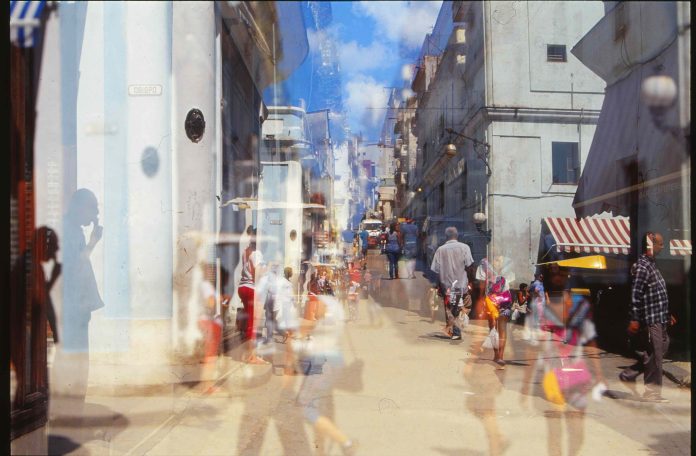The sensation was that of riding on air, a wave of euphoria whose origin I could hardly trace.
I told them about the reroute. This was going to be exciting—if for no one else than at least myself, what with the pleasant diversion of driving a nine-foot wide, sixty-foot long articulated coach on new streets. Almost immediately a young woman bounced up and asked furtively, politely, “I know this isn’t a bus stop but is there any chance, possibly, maybe, that you could, just for today….”
“Sure,” I replied with a smile. “Quick, before, anyone sees!”
Her normal stop was twenty-seven blocks away. Look at that smile. Was she cute? Of course she was. Everybody’s cute, when they’re in the mood she was in.
I caught up to the bus scheduled just before me (my “leader,” in bus parlance), who’d neglected the reroute and was now paying the price in lost time. He was busy and crowded; we ambled along behind, hardly working and half empty, looking for people to pick up to make his job easier. Bus-savvy passengers know the second bus of two is always the preferred choice, and half the time ends up in the lead anyway. There’s room to sprawl out in here.
As I parked behind my leader at the transit center, my relief driver ambled over with a smile, understanding the situation at a glance. I explained the brilliance of the reroute to him, and we talked about turns and clearances and express lanes. Don’t you love how work jargon rolls right off the tongue? Bruce. He and I are birds of a feather.
I gestured to another passenger onboard, motioning the half-lost middle-aged mother to come forward and fret not, it’s okay now, Bruce the friendly bus driver is taking over and all is well again. I identified her to Bruce as “the wonderful young lady up front,” and she laughed, maybe because she needed to: she was on her way to comfort a sick sibling, had flown in from out of town to do so. Ah, family. I gave Bruce the bus and walked away with a smile, listening to their two voices merging.
Driving the base car back to the base to clock out, sitting in slow but moving traffic, moving faster now, with the radio tuned to friendly voices, interviews and laughter. The swishing wipers offer a backbeat, the drum rhythm of city life. I dashed into the base, signing my name out and returning the base car. The window man asked if I was coming back for my second shift later on.
“In a few hours,” I replied, quipping, “I’m gonna go home and think about it for a while!”
“Do you know Nathan?” he asked a nearby supervisor.
“Do I know Nathan? Of course I know Nathan! Filmmaker, blogger, bus driver photographer extraordinaire…”
“Oh gosh, you guys,” I said.
The other continued, “but have you met Nathan? There’s knowing and there’s meeting. I know who the president is…”
“Oh no, don’t compare me to that guy! We’re two different people, I swear!”
I jogged back out into the pouring parking lot, excited to rush home for a few hours, enough time to cook a meal, work on my film, write this draft, and who knows– maybe even relax for a second. I leapt over the water puddles toward my car, calling out to another colleague, “wonderful weather we’re having!”
“Um, yeah,” she cried, shaking her head. “I love swimholes!!”
The metaphor of a pot reaching a boil isn’t generally used to describe the sensation of such mundane tasks, but isn’t that exactly what the most worthwhile, most deeply earned bliss feels like? These were the moments in between, that by rights should barely register in the raising of our mood, if we’re to believe what we’re told… who knew these things could make my day? Running to my car in the rain, reroutes and road reliefs?
There is a type of well-being that floods one’s system almost surreptitiously. It is the slow accumulation of interactions in which we feel whole, accepted—loved not by our loved ones but by everyone, included in the fabric of the world at large, the embrace that tells us it’s okay to be who we are. It seems to come from nowhere, but it’s a torrent coursing through your veins. Belonging. Oddly, the effect is strongest in interactions with people we barely know. We already know our small network of family and friends loves us. This is the world, speaking through the language of the ordinary, telling you your family is the entire population.
When you’re nice to a stranger, you may be helping them toward that sensation, building a block, offering one of a series of moments that infuses them with that unspeakably beautiful feeling of acceptance. I’ve said it before, and I’ll say it again—the positive impact you have on others will always be larger than you’re aware.
Nathan Vass is an artist, filmmaker, photographer, and author by day, and a Metro bus driver by night, where his community-building work has been showcased on TED, NPR, The Seattle Times, KING 5 and landed him a spot on Seattle Magazine’s 2018 list of the 35 Most Influential People in Seattle. He has shown in over forty photography shows is also the director of nine films, six of which have shown at festivals, and one of which premiered at Henry Art Gallery. His book, The Lines That Make Us, is a Seattle bestseller and 2019 WA State Book Awards finalist.


